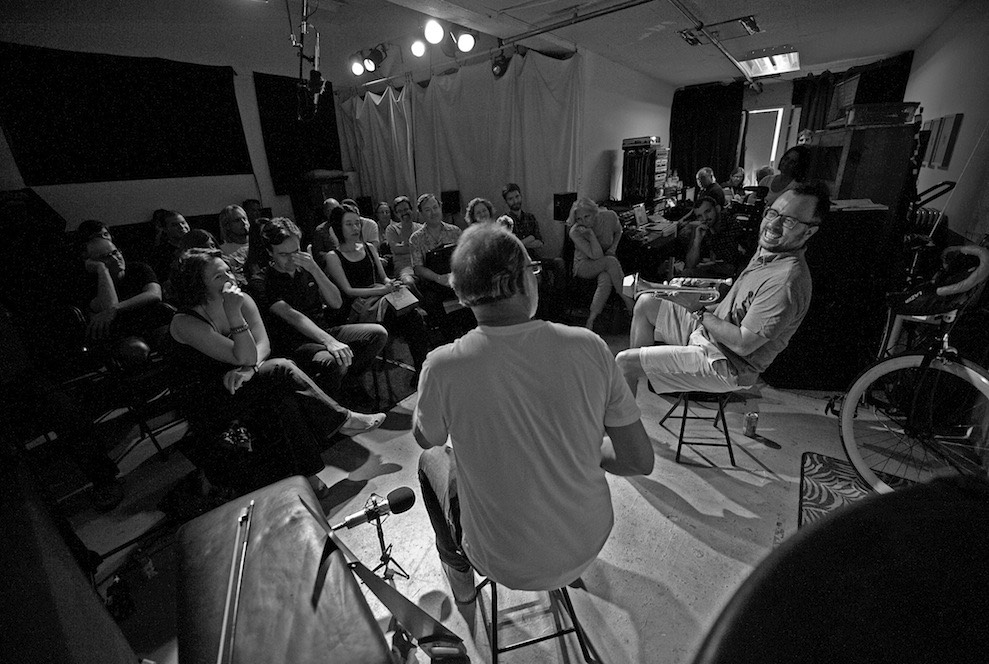Sound artist, composer and producer, Gustavo Matamoros, describes the mission and origins of Audiotheque, in counterpoint with several recent performances.
AUDIOTHEQUE @ ARTCENTER/SOUTH FLORIDA
Gustavo Matamoros remains a stalwart figure along the 800 and 900 blocks of Lincoln Road, and his mission remains consistent: Support those who create, present and appreciate experimental music. Often considered an elitist genre – cacophonous and inscrutable – Matamoros’ democratic approach is exemplified by his six-year “broadcast” of original compositions programmed by guest sound artists through the “Listening Gallery,” an array of loudspeakers mounted under the awnings at 800-810 Lincoln Rd.
While millions of passersby remained oblivious, thousands were intrigued by unexpected sounds – often ethereal – that contrasted starkly with the conventional barrage of pop music bouncing between stores and restaurants. This disparity parallels the attractive force of the ArtCenter/South Florida’s galleries and studios, resonating on a different level from the ubiquitous commercial eye candy.
The Listening Gallery, commissioned by the Center in 2009 and supported by a Knight Arts Challenge grant, initiated Matamoros’ relationship with AC/SF, and Audiotheque began as its production studio in the 924 building. Executive Director María del Valle assumed her position in 2012. “From the start we realized we have a shared goal to become a place for sound art and experimental music,” she said.
The 45-seat, acoustically balanced and thoroughly equipped sound art laboratory, hosts intimate presentations, discussion and recording sessions – with webstreaming facilitated by retired WLRN producer Steve Malagodi.
“He [Matamoros] is now like a non-profit in residence. He’s doing what he wants, and we give logistical support and promotion,” explained del Valle, “but he’s totally independent.” More tangibly, the Center provides reduced rent and free Internet service. Volunteer support is vital, as most events are funded by donation.
Coordinated event scheduling and outreach intermingle Audiotheque “Listening Club” audiences with those attending a “Studio Crawl” or artist talk. Elegantly melding vision, genre and audience, during last year’s Subtropics Festival, internationally recognized composer/visual artist Alba Triana’s exhibition in the Project 924 gallery exemplified the collaborative potential. Matamoros invited her; curator Susan Caraballo and the Center provided space, lighting, pedestals, texts, placement and promotion for her kinetic, interactive works.
Del Valle is transitioning the Center from a low-rent haven for local artists to an increasingly “serious” center of study, experimentation, exhibition and exchange. Until February, Caraballo served as artistic director, expanding the visiting artist residency. Now that the Center has sold its 810 building (while retaining 924) and is planning for a new facility, the opening of ArtCenter [Downtown], (formerly Cannonball) catapults its residency plan forward. Del Valle envisions deepening the relationship with Audiotheque by underwriting sound and interdisciplinary artist residencies and partnering with Audiotheque to develop those artists’ exhibition, workshop and performance programs.
Caracas-born, Matamoros has lived in Miami since 1979, composing and performing his own diverse and frequently collaborative sonic explorations, while providing venues for hundreds of colleagues – whether preeminent or nascent talents. Since 1989 the biennial Subtropics Festival for Experimental Music has presented 1,000+ performances. Matamoros has also developed concerts, workshops and sound installations for Miami-Dade and Broward colleges, the Arsht Center, FIU, museums, parks, gardens and New World Symphony. “All these projects are simply ways of designing community around music, around sound,” he said.
“I want him here because we’ve benefited a lot. There’s no other place or organization like it,” said del Valle. “We plan more support for Subtropics next year and the ArtCenter plans to enhance its related programming.”
During a break in the densely packed six-hour new music Marathon on March 5th, Matamoros noted that the small, but vibrant scene here (which ranges from fresh-faced music school grads to “graybeards”), mirrors New York in the ’70s, when “local artists,” such as Christian Marclay, Meredith Monk, James Staley, Philip Glass and John Zorn gradually became the luminaries of their genre.
Matamoros uses any means necessary to encourage “thinking with our ears” – whether a Listening Club presentation/discussion with Armando Rodríguez playing Galician bagpipes, David Dunn’s recording of pine beetles devouring a tree or DJ le Spam sampling his locally produced gospel and rockabilly collection. The Audiotheque maintains a massive archive of experimental music from the ’70s to this month.
While Matamoros brings innovators to town for brief festival appearances, he also offers residencies that enrich both artists and audiences. Chicago-based cellist-composer Fred Lonberg-Holm immersed himself in Miami’s beach, wetlands and roadway sounds. He left with sonic souvenirs (including recorded bat squeaks), but first guided Audiotheque patrons on a (mostly vinyl) tour of the cello in jazz and experimental music, plied his instrument in concert as a drum, sonic laboratory and electric guitar and guided a pickup orchestra through open form improvisation.
“It’s a laboratory where things can get created, get presented, get tested, and then the audience becomes part of the process," said Matamoros.
For further info and program schedule: www.subtropics.org
Media sample: bitly.com/AudiothequeIntro
